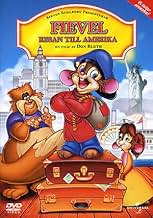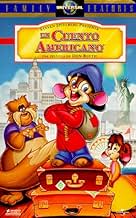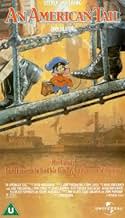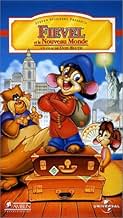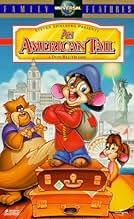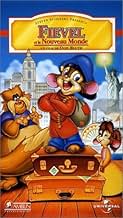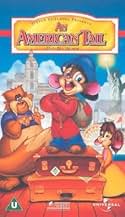En émigrant aux États-Unis, une jeune souris russe est séparée de sa famille et doit la reloger tout en essayant de survivre dans un nouveau pays.En émigrant aux États-Unis, une jeune souris russe est séparée de sa famille et doit la reloger tout en essayant de survivre dans un nouveau pays.En émigrant aux États-Unis, une jeune souris russe est séparée de sa famille et doit la reloger tout en essayant de survivre dans un nouveau pays.
- Réalisation
- Scénario
- Casting principal
- Nommé pour 1 Oscar
- 6 victoires et 7 nominations au total
Dom DeLuise
- Tiger
- (voix)
Christopher Plummer
- Henri
- (voix)
Pat Musick
- Tony Toponi
- (voix)
Cathianne Blore
- Bridget
- (voix)
Neil Ross
- Honest John
- (voix)
Betsy Cathcart
- Tanya Mousekewitz
- (voix (chant))
- (non crédité)
Johnny Guarnieri
- Italian Singer Mouse
- (voix)
- (non crédité)
Warren Hays
- Irish Singer Mouse
- (voix)
- (non crédité)
T. Daniel Hofstedt
- No Cats in America Chorus
- (voix)
- (non crédité)
Avis à la une
Ex-Disney animator Don Bluth brings us a tail (sorry, TALE! Well, that's the proper word in the context!) of the Russian Mousekewitz mouse family, who, like all of the other mice in late 1800's Russia, want to escape from the cats. They dream of a land known as America, where there are no cats. Travelling to
Germany, they board a ship bound for America.
However, during a violent storm, little Fievel Mousekewitz (voiced by Phillip Glasser) becomes separated from his parents and sisters. Fortunately for Fievel he was saved from drowning by being ensconced within a bottle, which quite by chance floats to New York, USA. Unfortunately not only is America very big, but it -- well, let's just say that for all mice concerned it's not all it was cracked up to be.
With the help of friends such as Tony Toponi (voiced by Pat Musick) and Tiger (Dom DeLuise), Fievel goes on a mammoth quest to become reunited with his
family.
Although it is a little on the sentimental side, it does have a certain charm, which is further helped by James Horner's musical score, as well as the wonderful
song 'Somewhere Out There' which has since become my favourite duet of all
time (I've even sung the end-credits version, as sung by Linda Ronstadt and
James Ingram, on Karaoke!). Some adults may not like the sentimentality, but stick with it, and you'll be rewarded with a gem, particularly if watching with either the young or the young-at-heart.
Germany, they board a ship bound for America.
However, during a violent storm, little Fievel Mousekewitz (voiced by Phillip Glasser) becomes separated from his parents and sisters. Fortunately for Fievel he was saved from drowning by being ensconced within a bottle, which quite by chance floats to New York, USA. Unfortunately not only is America very big, but it -- well, let's just say that for all mice concerned it's not all it was cracked up to be.
With the help of friends such as Tony Toponi (voiced by Pat Musick) and Tiger (Dom DeLuise), Fievel goes on a mammoth quest to become reunited with his
family.
Although it is a little on the sentimental side, it does have a certain charm, which is further helped by James Horner's musical score, as well as the wonderful
song 'Somewhere Out There' which has since become my favourite duet of all
time (I've even sung the end-credits version, as sung by Linda Ronstadt and
James Ingram, on Karaoke!). Some adults may not like the sentimentality, but stick with it, and you'll be rewarded with a gem, particularly if watching with either the young or the young-at-heart.
I was introduced to An American Tail after perpetually reading the 'book' of the second film, Feivel Goes West. I can't say which one I enjoyed more although at the time, I think I was seven, but this one I understood a lot better.
The sweet-hearted tale of a family of Russian mouse emigrants who travel to America, the 'land of opportunity' but on their way lose their son, really manages to perk up your day. It has all the classic elements of a family flick: great characters, wonderful score and songs, and of course a happy ending (You can't say you didn't expect that).
In some ways it's meant to be almost a satire, a parallel story of many Russian immigrant families who flee to America from the Cossacks: there is actually a scene in the beginning involving the ransacking of a Russian village by Cossacks, aided of course, as most history books conveniently omit, by their vicious slavering cats who destroy the mouse population. This satire is slightly lost once they reach America, but the simple plot of the mouse boy trying to find his family again works very well. It's quite frustrating at times as we see how close they all come to running into each other; a split second here and a well-timed door slamming there, and it could have been all over in thirty minutes of screen time. But where would be the movie in that?
Lastly, the voice cast does a great job. While I personally think the sequel had a better cast, An American Tail boasts some fine names as well - Dom DeLuise and Nehemiah Persoff who also did the sequel, Christopher Plummer, and Madeline Kahn all combine for a great effect. It's not necessary to see this to also see the sequel but it definitely deserves to be watched. Touching, light-hearted and with one of the most beautiful theme songs you will ever hear, it's a winner. ***1/2 / *****
The sweet-hearted tale of a family of Russian mouse emigrants who travel to America, the 'land of opportunity' but on their way lose their son, really manages to perk up your day. It has all the classic elements of a family flick: great characters, wonderful score and songs, and of course a happy ending (You can't say you didn't expect that).
In some ways it's meant to be almost a satire, a parallel story of many Russian immigrant families who flee to America from the Cossacks: there is actually a scene in the beginning involving the ransacking of a Russian village by Cossacks, aided of course, as most history books conveniently omit, by their vicious slavering cats who destroy the mouse population. This satire is slightly lost once they reach America, but the simple plot of the mouse boy trying to find his family again works very well. It's quite frustrating at times as we see how close they all come to running into each other; a split second here and a well-timed door slamming there, and it could have been all over in thirty minutes of screen time. But where would be the movie in that?
Lastly, the voice cast does a great job. While I personally think the sequel had a better cast, An American Tail boasts some fine names as well - Dom DeLuise and Nehemiah Persoff who also did the sequel, Christopher Plummer, and Madeline Kahn all combine for a great effect. It's not necessary to see this to also see the sequel but it definitely deserves to be watched. Touching, light-hearted and with one of the most beautiful theme songs you will ever hear, it's a winner. ***1/2 / *****
Don't take me wrong: although An American Tail is a wonderful film, the old Disney classics are not the ones I'm talking about in the summary. I'm talking about the over-commercialized crap we get these days. Don Bluth's second animated feature is again about mice, like Secret of NIMH. I think NIMH was better, though not by much. The songs are pretty good, although not like some Disney songs. The animation, however, is simply gorgeous. I can't believe people dismiss it as poorly animated just because the colors aren't bright! The colors are dark and moody, as they should be, An American Tail--nor any of Bluth's films--were ever supposed to look like Rayman. If you want to see Bluth with bright colors, glance at some cheery scenes from A Troll in Central Park. I find the way Fievel and his family miss each other by inches frustrating, though. In fact, I was surprised Fievel and Tanya couldn't hear each other as they sang "Somewhere Out There". A simply beautiful film, a must for anyone who looks for variation in the field of animation, but infuriating for anyone who thinks the scope of animation should be restricted to Disney.
I agree that the standards set by Walt and his animators are the only ones that matter when it comes to judging animated films, and I had trouble accepting this to, but there are OTHER ANIMATION COMPANIES!! No one would dare describe "Shrek" (which sucked) as a Disney movie, so let's leave Don Bluth alone, okay?
Having said that, this movie is absolutely wonderful. A heartwarming story, beautiful songs (including the now standard "Somewhere Out There") great performances and the animation is stellar. Much darker and grittier than any story Disney would even dream of making, it revolves around an immigrant mouse named Fievel, whose family comes to America to escape oppression ("In America," says Poppa, "There are no cats."). Fievel learns the hard way that America has its problems, too.
In my opinion, this movie is worth seeing solely for Dom DeLuise's characterization of the soft-hearted alley cat Tiger. All in all, this is probably the best Don Bluth has ever made.
Having said that, this movie is absolutely wonderful. A heartwarming story, beautiful songs (including the now standard "Somewhere Out There") great performances and the animation is stellar. Much darker and grittier than any story Disney would even dream of making, it revolves around an immigrant mouse named Fievel, whose family comes to America to escape oppression ("In America," says Poppa, "There are no cats."). Fievel learns the hard way that America has its problems, too.
In my opinion, this movie is worth seeing solely for Dom DeLuise's characterization of the soft-hearted alley cat Tiger. All in all, this is probably the best Don Bluth has ever made.
Not only is An American Tail easily one of the best animated features ever made, but it proves to be leaps beyond the efforts of recent Disney movies by refusing to be constricted to an all-too-familiar formula. This movie does not stay within the cozy, comfortable guidelines that Disney adheres to in order to make money. Instead, it tells a truly unique tale, one not borrowed from any other source, and one overflowing with artistic wonder and originality.
The characters you will see here are not stock, not pulled from the typical Disney hat. The story is not a chuckle-a-minute, lowbrow attempt to take the easy way out in pandering to children. The main character, Fievel, suffers real hardships and tragedy, and stares into the despair of his own soul before the movie is finished. This, of course, makes the ending that much more satisfying, an infinitely more significant and authentic moment than any cardboard cut-out Disney plot.
If you want to see what animation was meant to be as an art form, if you want to feel the power and emotion that can truly be reaped from this under-appreciated and over-commercialized medium, look no further than An American Tail.
The characters you will see here are not stock, not pulled from the typical Disney hat. The story is not a chuckle-a-minute, lowbrow attempt to take the easy way out in pandering to children. The main character, Fievel, suffers real hardships and tragedy, and stares into the despair of his own soul before the movie is finished. This, of course, makes the ending that much more satisfying, an infinitely more significant and authentic moment than any cardboard cut-out Disney plot.
If you want to see what animation was meant to be as an art form, if you want to feel the power and emotion that can truly be reaped from this under-appreciated and over-commercialized medium, look no further than An American Tail.
Le saviez-vous
- AnecdotesFievel was the name of Steven Spielberg's grandfather.
- GaffesIn the cat's lair Tiger mentions to Fievel that he is a fan of broccoli. The film is set in the 1885-1886 time frame. Both broccoli and cauliflower were unknown in the United States then. In fact, both vegetables were not commercially grown in the United States until Italian immigrants started commercially growing both vegetables in California in the 1920s.
- Citations
Honest John: [At the wake of Mickey O'Hare] Poor lad. So young. He never had a chance to vote. Well, he'll vote from now on. I'll make sure of that.
[Writes Mickey's name on a notebook under "Ghost Votes"]
- Crédits fousThe first half of the end credits feature period engravings of what New York City looked like in the 1880s.
- Versions alternativesThe 2006 DVD release includes a remastered 5.1 soundtrack, both in Dolby Digital and DTS. It also has some dialogue changes compared to the original, most noticeably: Extra dialogue that was recorded but never used, and different voices for the orphans towards the end of the film (adults instead of kids - these are actually the original voices, which were replaced by children after the scene was animated).
- ConnexionsEdited from Brisby et le secret de NIMH (1982)
- Bandes originalesThere Are No Cats in America
Music by James Horner and Barry Mann
Lyrics by Cynthia Weil
Performed by Nehemiah Persoff, Johnny Guarnieri, and Warren Hays
Meilleurs choix
Connectez-vous pour évaluer et suivre la liste de favoris afin de recevoir des recommandations personnalisées
Détails
- Date de sortie
- Pays d’origine
- Langue
- Aussi connu sous le nom de
- Un cuento americano
- Lieux de tournage
- Sociétés de production
- Voir plus de crédits d'entreprise sur IMDbPro
Box-office
- Montant brut aux États-Unis et au Canada
- 47 483 002 $US
- Week-end de sortie aux États-Unis et au Canada
- 5 234 446 $US
- 23 nov. 1986
- Montant brut mondial
- 84 542 002 $US
- Durée1 heure 20 minutes
- Couleur
- Mixage
Contribuer à cette page
Suggérer une modification ou ajouter du contenu manquant

Lacune principale
By what name was Fievel et le Nouveau Monde (1986) officially released in India in Hindi?
Répondre
